TED演讲集-八个成功秘笈(视频)《今日听力精华》-中英文双语
8-secrets-of-success成功的八个秘诀Ted演讲台词
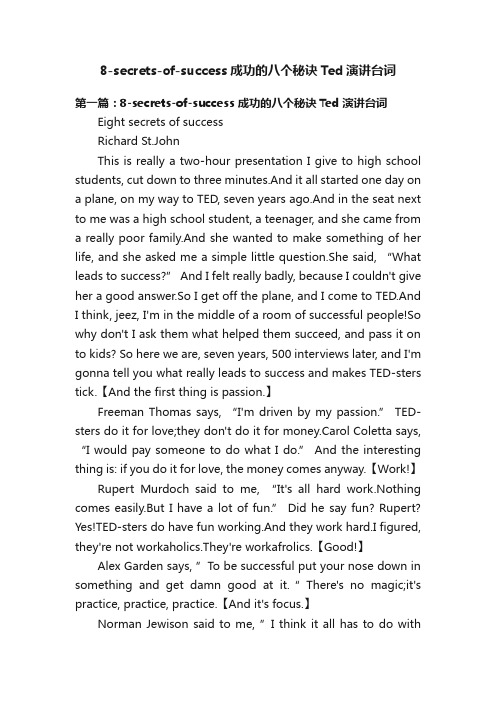
8-secrets-of-success成功的八个秘诀Ted演讲台词第一篇:8-secrets-of-success 成功的八个秘诀Ted演讲台词Eight secrets of successRichard St.JohnThis is really a two-hour presentation I give to high school students, cut down to three minutes.And it all started one day on a plane, on my way to TED, seven years ago.And in the seat next to me was a high school student, a teenager, and she came from a really poor family.And she wanted to make something of her life, and she asked me a simple little question.She said, “What leads to success?” And I felt really badly, because I couldn't give her a good answer.So I get off the plane, and I come to TED.And I think, jeez, I'm in the middle of a room of successful people!So why don't I ask them what helped them succeed, and pass it on to kids? So here we are, seven years, 500 interviews later, and I'm gonna tell you what really leads to success and makes TED-sters tick.【And the first thing is passion.】Freeman Thomas says, “I'm driven by my passion.” TED-sters do it for love;they don't do it for money.Carol Coletta says, “I would pay someone to do what I do.” And the interesting thing is: if you do it for love, the money comes anyway.【Work!】Rupert Murdoch said to me, “It's all hard work.Nothing comes easily.But I have a lot of fun.” Did he say fun? Rupert? Yes!TED-sters do have fun working.And they work hard.I figured, they're not workaholics.They're workafrolics.【Good!】Alex Garden says, ”To be successful put your nose down in something and get damn good at it.“ There's no magic;it's practice, practice, practice.【And it's focus.】Norman Jewison said to me, ”I think it all has to do withfocusing yourself on one thing.“【And push!】David Gallo says, ”Push yourself.Physically, mentally, you've gotta push, push, push.“ You gotta push through shyness and self-doubt.Goldie Hawn says, ”I always had self-doubts.I wasn't good enough;I wasn't smart enough.I didn't think I'd make it.“ Now it's not always easy to push yourself, and that's why they invented mothers.(Laughter)Frank Gehry — Frank Gehry said to me, ”My mother pushed me.“【Serve!】Sherwin Nuland says, ”It was a privilege to serve as a doctor.“ Now a lot of kids t ell me they want to be millionaires.And the first thing I say to them is: ”OK, well you can't serve yourself;【Ideas!】TED-ster Bill Gates says, ”I had an idea: founding the first micro-computer software company.“ I'd say it was a pretty good idea.And there's no magic to creativity in coming up with ideas —it's just doing some very simple things.And I give lots of evidence.【Persist!】Joe Kraus says, ”Persistence is the number one reason for our success.“ You gotta persist through failure.You gotta persist through crap!Which of course means ”Criticism, Rejection, Assholes and Pressure.“(Laughter)So, the big — the answer to this question is simple: Pay 4,000 bucks and come to TED.Or failing that, do the eight things — and trust me, these are the big eight things that lead to success.Thank you TED-sters for all your interviews!第二篇:TED演讲成功的两大秘诀TED演讲成功的两大秘诀一前期准备工作当我想到要做一个扣人心弦的演讲,在我脑海中浮现的是去带着观众踏上一段旅途。
TED演讲成功的秘诀
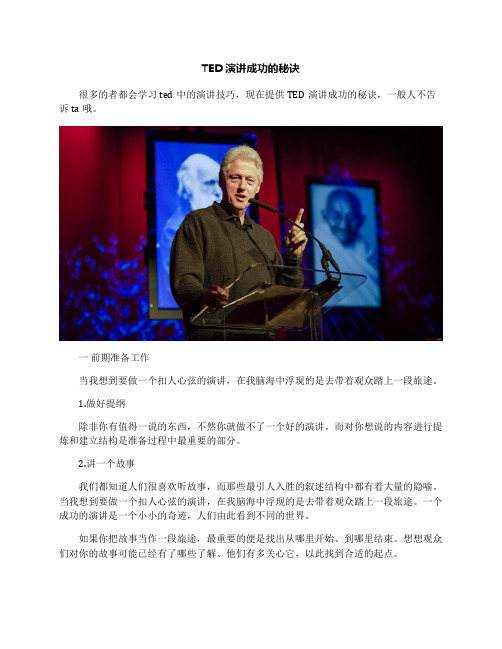
TED演讲成功的秘诀很多的者都会学习ted中的演讲技巧,现在提供TED演讲成功的秘诀,一般人不告诉ta哦。
一前期准备工作当我想到要做一个扣人心弦的演讲,在我脑海中浮现的是去带着观众踏上一段旅途。
1.做好提纲除非你有值得一说的东西,不然你就做不了一个好的演讲。
而对你想说的内容进行提炼和建立结构是准备过程中最重要的部分。
2.讲一个故事我们都知道人们很喜欢听故事,而那些最引人入胜的叙述结构中都有着大量的隐喻。
当我想到要做一个扣人心弦的演讲,在我脑海中浮现的是去带着观众踏上一段旅途。
一个成功的演讲是一个小小的奇迹,人们由此看到不同的世界。
如果你把故事当作一段旅途,最重要的便是找出从哪里开始、到哪里结束。
想想观众们对你的故事可能已经有了哪些了解、他们有多关心它,以此找到合适的起点。
最棒的演讲者会非常快速地介绍主题,解释他们自己为什么会对这个话题感兴趣,并说服观众相信他们也应该关注这个主题。
3.突出重点我在演讲者的初稿中发现的最大问题是会涵盖太多内容。
你无法在一个演讲中去概括整个行业。
如果你试图将你知道的所有东西都塞进演讲,那就没时间去举出关键的细节了,而且你的演讲会因各种抽象的语言而晦涩难懂,从而会导致本身就懂的人能听得懂,而之前不懂的人就不知所云了。
你需要举出具体的例子来使你的想法有血有肉,充实起来。
不要一心想把所有东西都纳入到一个短短的演讲。
相反地,要深入。
不要告诉我们你研究的整个领域,告诉我们你的独特贡献。
当然,过度阐述或者纠结于内容的意义也不可行。
对这种情况有另一套补救的方法。
记住,观众们很聪明。
让他们自己去找寻出一些意义,去各自归纳收获的结论。
4.营造悬念很多顶级的演讲具有着侦探小说般的叙事结构,演讲者引出问题开始演讲,然后介绍寻求解决方法的过程,直到恍然大悟的一刻,这时观众自会看到这一切叙述的意义。
如果一个演讲失败了,几乎都是因为讲者没有设计好整个故事,错误估计了观众的兴趣点,或者忽略了故事本身。
SecretofSuccess(成功的秘诀)
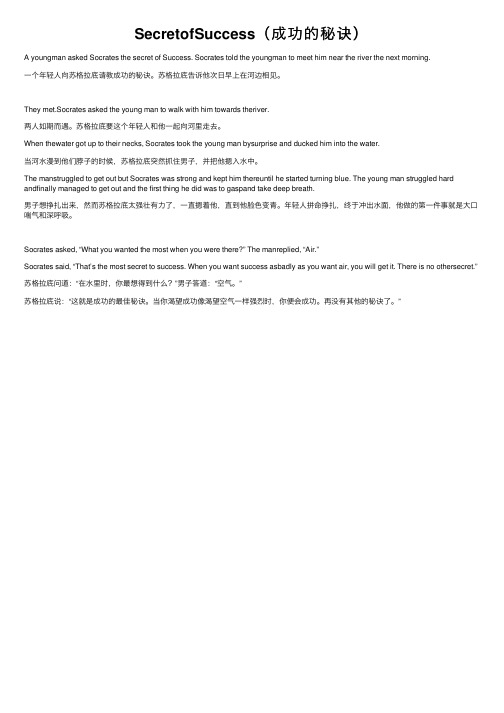
SecretofSuccess(成功的秘诀)A youngman asked Socrates the secret of Success. Socrates told the youngman to meet him near the river the next morning.⼀个年轻⼈向苏格拉底请教成功的秘诀。
苏格拉底告诉他次⽇早上在河边相见。
They met.Socrates asked the young man to walk with him towards theriver.两⼈如期⽽遇。
苏格拉底要这个年轻⼈和他⼀起向河⾥⾛去。
When thewater got up to their necks, Socrates took the young man bysurprise and ducked him into the water.当河⽔漫到他们脖⼦的时候,苏格拉底突然抓住男⼦,并把他摁⼊⽔中。
The manstruggled to get out but Socrates was strong and kept him thereuntil he started turning blue. The young man struggled hard andfinally managed to get out and the first thing he did was to gaspand take deep breath.男⼦想挣扎出来,然⽽苏格拉底太强壮有⼒了,⼀直摁着他,直到他脸⾊变青。
年轻⼈拼命挣扎,终于冲出⽔⾯,他做的第⼀件事就是⼤⼝喘⽓和深呼吸。
Socrates asked, “What you wanted the most when you were there?” The manreplied, “Air.”Socrates said, “That’s the most secret to success. When you want success asbadly as you want air, you will get it. There is no othersecret.”苏格拉底问道:“在⽔⾥时,你最想得到什么?”男⼦答道:“空⽓。
成功八步演讲视频骆超老师成功八步演讲视频
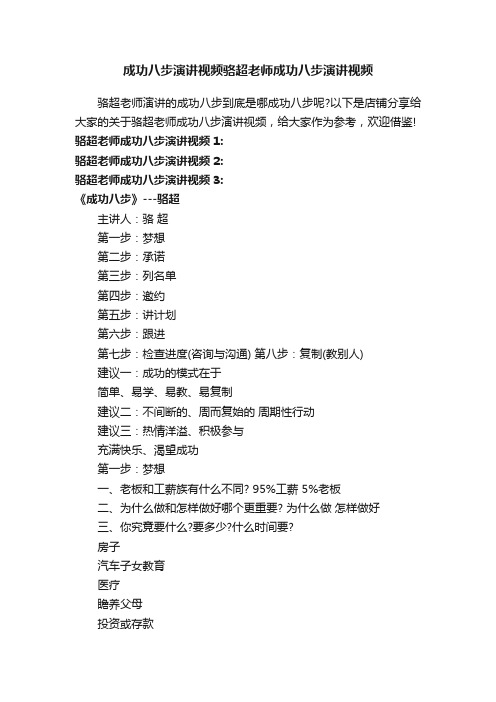
成功八步演讲视频骆超老师成功八步演讲视频骆超老师演讲的成功八步到底是哪成功八步呢?以下是店铺分享给大家的关于骆超老师成功八步演讲视频,给大家作为参考,欢迎借鉴! 骆超老师成功八步演讲视频1:骆超老师成功八步演讲视频2:骆超老师成功八步演讲视频3:《成功八步》---骆超主讲人:骆超第一步:梦想第二步:承诺第三步:列名单第四步:邀约第五步:讲计划第六步:跟进第七步:检查进度(咨询与沟通) 第八步:复制(教别人)建议一:成功的模式在于简单、易学、易教、易复制建议二:不间断的、周而复始的周期性行动建议三:热情洋溢、积极参与充满快乐、渴望成功第一步:梦想一、老板和工薪族有什么不同? 95%工薪 5%老板二、为什么做和怎样做好哪个更重要? 为什么做怎样做好三、你究竟要什么?要多少?什么时间要?房子汽车子女教育医疗瞻养父母投资或存款生活费用合计:第二步:承诺承诺的三个等级试试看尽力而为全力以赴一、学习书视听资料培训咨询产品目标二、改变改变从观念开始改变从自身开始改变从小事开始改变从现在开始三、创业的三种途径创建一个系统(人、财、物、进、销、存、产) 购买一个系统(麦当劳、肯德基) 加盟一个系统(傲普、保险) 第三步:列名单一、网络经营的两大财富:财富=人脉×时间二、列名单的三个原则: 1、不做判官 (写下来、向上推荐、20~30人) 2、越大越好(不死盯1人、随时整理、200~300人) 3、不要丢失 (迅速整理记录、保持联络、备份2~3份)三、名单分类法亲友(先亲后疏) 邻居(先近后远) 校友(从大到小) 同事或其他合作伙伴(从远到近) 朋友(千万不要忘记过去的朋友) 一面之交者和新结识的人四、结识陌生人1、每天交新朋友成为习惯. 2、创造再次见面的机会(半月轮回法) 3、交朋友的三个阶段:彼此喜欢(亲和力) 建立关系(关心别人) 相互信任(帮助别人) 4、个人友谊的三个层次信任推崇欣赏第四步:邀约一、邀约的种类 1、电话邀约 2、面对面邀约 3、书信、电子邮件、网上联络短信息、传真邀约二、邀约的三个原则 1、高姿态 2、三不谈 3、专业化三、邀约中的10个注意事项1、先学习2、尽量快3、要兴奋4、说清楚5、邀一对6、多三倍7、二选一 8、别迟疑9、多推崇 10、勤咨询四、专业化邀约使用台词卡的三个建议:1、先使用2、照着念3、反复练熟人邀约;第三者邀约;一面之交邀约。
成功的八个秘诀8 secrets of success
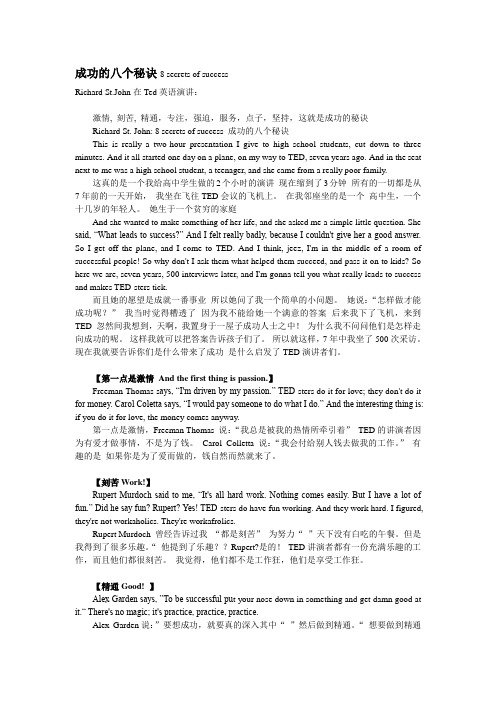
成功的八个秘诀8 secrets of successRichard St.John在Ted英语演讲:激情, 刻苦, 精通,专注,强迫,服务,点子,坚持,这就是成功的秘诀Richard St. John: 8 secrets of success 成功的八个秘诀This is really a two-hour presentation I give to high school students, cut down to three minutes. And it all started one day on a plane, on my way to TED, seven years ago. And in the seat next to me was a high school student, a teenager, and she came from a really poor family.这真的是一个我给高中学生做的2个小时的演讲现在缩到了3分钟所有的一切都是从7年前的一天开始,我坐在飞往TED会议的飞机上。
在我邻座坐的是一个高中生,一个十几岁的年轻人。
她生于一个贫穷的家庭And she wanted to make something of her life, and she asked me a simple little question. She said, “What leads to success?” And I felt really badly, because I couldn't give her a good answer. So I get off the plane, and I come to TED. And I think, jeez, I'm in the middle of a room of successful people! So why don't I ask them what helped them succeed, and pass it on to kids? So here we are, seven years, 500 interviews later, and I'm gonna tell you what really leads to success and makes TED-sters tick.而且她的愿望是成就一番事业所以她问了我一个简单的小问题。
ted 演讲如何学好英语
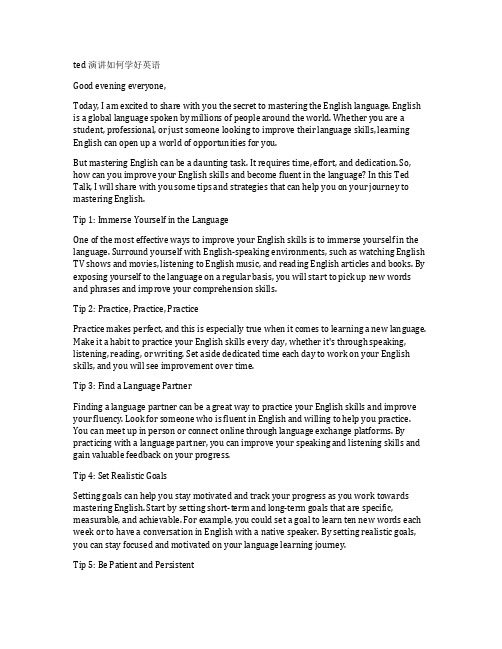
ted 演讲如何学好英语Good evening everyone,Today, I am excited to share with you the secret to mastering the English language. English is a global language spoken by millions of people around the world. Whether you are a student, professional, or just someone looking to improve their language skills, learning English can open up a world of opportunities for you.But mastering English can be a daunting task. It requires time, effort, and dedication. So, how can you improve your English skills and become fluent in the language? In this Ted Talk, I will share with you some tips and strategies that can help you on your journey to mastering English.Tip 1: Immerse Yourself in the LanguageOne of the most effective ways to improve your English skills is to immerse yourself in the language. Surround yourself with English-speaking environments, such as watching English TV shows and movies, listening to English music, and reading English articles and books. By exposing yourself to the language on a regular basis, you will start to pick up new words and phrases and improve your comprehension skills.Tip 2: Practice, Practice, PracticePractice makes perfect, and this is especially true when it comes to learning a new language. Make it a habit to practice your English skills every day, whether it's through speaking, listening, reading, or writing. Set aside dedicated time each day to work on your English skills, and you will see improvement over time.Tip 3: Find a Language PartnerFinding a language partner can be a great way to practice your English skills and improve your fluency. Look for someone who is fluent in English and willing to help you practice. You can meet up in person or connect online through language exchange platforms. By practicing with a language partner, you can improve your speaking and listening skills and gain valuable feedback on your progress.Tip 4: Set Realistic GoalsSetting goals can help you stay motivated and track your progress as you work towards mastering English. Start by setting short-term and long-term goals that are specific, measurable, and achievable. For example, you could set a goal to learn ten new words each week or to have a conversation in English with a native speaker. By setting realistic goals, you can stay focused and motivated on your language learning journey.Tip 5: Be Patient and PersistentLearning a new language takes time and effort, so it's important to be patient and persistent. Don't get discouraged if you make mistakes or if progress is slow. Keep practicing, stay motivated, and celebrate your achievements along the way. Remember that mastering English is a journey, and with dedication and perseverance, you can achieve your language learning goals.In conclusion, mastering English is a challenging but rewarding journey. By immersing yourself in the language, practicing regularly, finding a language partner, setting realistic goals, and being patient and persistent, you can improve your English skills and become fluent in the language. Remember that everyone's language learning journey is unique, so find the strategies that work best for you and stay committed to your goals.Thank you for listening, and best of luck on your journey to mastering English. Keep practicing, stay motivated, and never give up. Happy language learning!。
励志英语 八个准则帮你成功实现人生目标
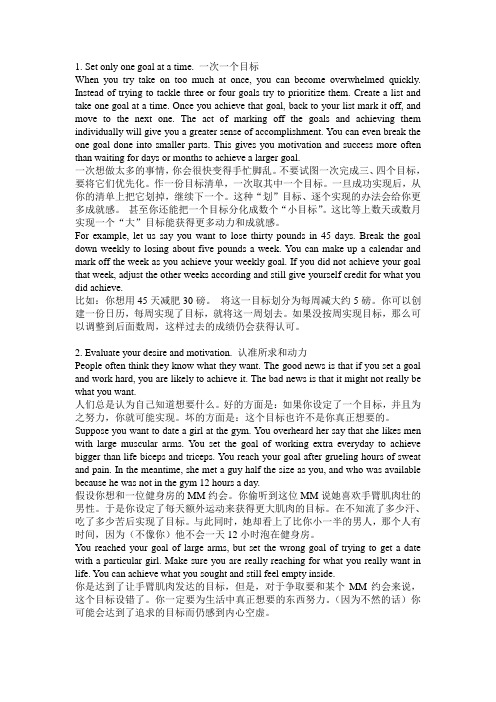
1. Set only one goal at a time. 一次一个目标When you try take on too much at once, you can become overwhelmed quickly. Instead of trying to tackle three or four goals try to prioritize them. Create a list and take one goal at a time. Once you achieve that goal, back to your list mark it off, and move to the next one. The act of marking off the goals and achieving them individually will give you a greater sense of accomplishment. You can even break the one goal done into smaller parts. This gives you motivation and success more often than waiting for days or months to achieve a larger goal.一次想做太多的事情,你会很快变得手忙脚乱。
不要试图一次完成三、四个目标,要将它们优先化。
作一份目标清单,一次取其中一个目标。
一旦成功实现后,从你的清单上把它划掉,继续下一个。
这种“划”目标、逐个实现的办法会给你更多成就感。
甚至你还能把一个目标分化成数个“小目标”。
这比等上数天或数月实现一个“大”目标能获得更多动力和成就感。
For example, let us say you want to lose thirty pounds in 45 days. Break the goal down weekly to losing about five pounds a week. You can make up a calendar and mark off the week as you achieve your weekly goal. If you did not achieve your goal that week, adjust the other weeks according and still give yourself credit for what you did achieve.比如:你想用45天减肥30磅。
ted演讲12个最宝贵的人生经验英文演讲稿

ted演讲12个最宝贵的人生经验英文演讲稿【引言】在众多的TED演讲中,有一位演讲者分享了他一生中积累的12个宝贵的人生经验。
这些经验不仅具有很强的可读性,而且具有很高的实用性。
在这篇文章中,我们将详细介绍这12个人生经验,希望能对读者有所启发。
【第一个人生经验:勇于尝试,不怕失败】第一个经验是勇于尝试新事物,不怕失败。
在我们的生活中,很多时候,机会和成功就隐藏在那些看似艰难的挑战中。
只有勇敢地去尝试,我们才能发现自己的潜力,实现自己的价值。
【第二个人生经验:保持好奇心,不断学习】第二个经验是保持好奇心,不断学习。
好奇心是推动人类进步的重要动力。
只有不断地学习,我们才能跟上时代的步伐,不断提升自己。
【第三个人生经验:坚持自己的梦想,克服困难】第三个经验是坚持自己的梦想,克服困难。
每个人都有自己的梦想,但实现梦想的过程并非一帆风顺。
我们需要坚定信念,勇敢面对困难,才能最终实现自己的梦想。
【第四个人生经验:建立良好的人际关系,懂得沟通】第四个经验是建立良好的人际关系,懂得沟通。
人际关系是我们生活中不可或缺的一部分。
通过有效沟通,我们可以更好地理解他人,增进友谊,促进合作。
【第五个人生经验:乐观积极,面对挫折勇往直前】第五个经验是乐观积极,面对挫折勇往直前。
在生活中,我们会遇到各种各样的挫折。
只有保持乐观的心态,我们才能勇敢地面对挫折,继续前行。
【第六个人生经验:勇于承认错误,并从中吸取教训】第六个经验是勇于承认错误,并从中吸取教训。
承认错误并不可怕,可怕的是重复犯错误。
我们需要勇于承认自己的错误,并从中吸取教训,不断进步。
【第七个人生经验:关注身体健康,保持良好的生活习惯】第七个经验是关注身体健康,保持良好的生活习惯。
身体是革命的本钱。
只有拥有健康的身体,我们才能更好地追求自己的目标和梦想。
【第八个人生经验:珍惜时间,合理安排生活和工作】第八个经验是珍惜时间,合理安排生活和工作。
时间是有限的,我们需要合理安排时间,才能在有限的时间里实现更多的价值。
8 Ways to Achieve Success-助你成功的八个方法
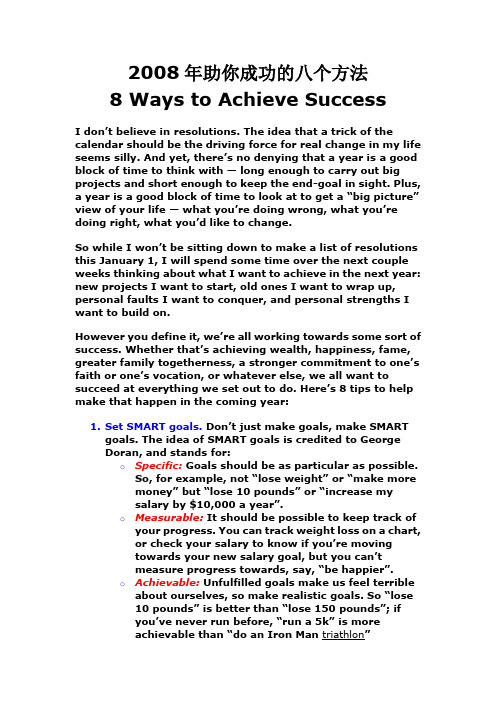
2008年助你成功的八个方法8 Ways to Achieve SuccessI don’t believe in resolutions. The idea that a trick of the calendar should be the driving force for real change in my life seems silly. And yet, there’s no denying that a year is a good block of time to think with — long enough to carry out big projects and short enough to keep the end-goal in sight. Plus, a year is a good block of time to look at to get a “big picture” view of your life —what you’re doing wrong, what you’re doing right, what you’d like to change.So while I won’t be sitting down to make a list of resolutions this January 1, I will spend some time over the next couple weeks thinking about what I want to achieve in the next year: new projects I want to start, old ones I want to wrap up, personal faults I want to conquer, and personal strengths I want to build on.However you define it, we’re all working towards some sort of success. Whether that’s achieving wealth, happiness, fame, greater family togetherness, a stronger commitment to one’s faith or one’s vocation, or whatever else, we all want to succeed at everything we set out to do. Here’s 8 tips to help make that happen in the coming year:1.Set SMART goals.Don’t just make goals, make SMARTgoals. The idea of SMART goals is credited to GeorgeDoran, and stands for:o Specific: Goals should be as particular as possible.So, for example, not “lose weight” or “make moremoney” but “lose 10 pounds” or “increase mysalary by $10,000 a year”.o Measurable: It should be possible to keep track of your progress. You can track weight loss on a chart,or check your salary to know if you’re movingtowards your new salary goal, but you can’tmeasure progress towards, say, “be happier”.o Achievable: Unfulfilled goals make us feel terrible about ourselves, so make realistic goals. So “lose10 pounds” is better than “lose 150 pounds”; ifyou’ve never run before, “run a 5k” is moreachievable than “do an Iron Man triathlon”o Relevant: Is this a goal that a) will have an impact on your life, and b) that you are prepared to pursue?If not, maybe your goals should be to attain theskills and resources you need to tackle the bigger,more distant goal.o Time-bound: Give yourself a clearly defined end date to achieve your goals by. This gives you asense of urgency, and also helps keep you focused— you want to lose 10 pounds by June, not at somepoint in the course of your life, right?How are you going to achieve success this yearwithout a plan?2.Make a plan. How are you going to achieve success thisyear without a plan? Planning is the big “gotcha” for lots of people — we might have a big general plan, but when it comes time to sit down and actually do something, we have no idea what to do. Write a plan for achieving your goals in specific, discrete, and doable actions, one after the other. If some steps are contingent on actions orconditions you don’t know right now, sketch them out as well as you can. Make a contingency plan, too, in case things don’t go as you thought they would.mit to a due date. Go through your list of projectsand assign each one a due date. Do the same for anyvague “I’d like to do this” things you have floatingaround in your head. I use a formula that goes “By March 31st, I will have [insert goal here]” and list everything I want to have finished by then, with matching lists forJune 30, September 30, and December 31. Maybequarters don’t work for you; if not, pick another way to do this, but do it.4.Make it public. Share your goals and commitments withother people — your partner, your parents, your friends and co-workers, your blog audience, anyone — to make the commitment more real. If you’ve told everyoneyou’re going to finish your novel by June 30, then you’ll have a powerful incentive to get it done. And they’ll help, too, if by nothing else than nagging you about it.5.Find a support group. A group of like-minded people withsimilar goals can be a great motivation. Not only willthey understand what’s holding you back, they may have tips that can help you overcome your blocks. And if not,chances are they’re struggling with the same things you are, and you can work through them together with theknowledge that it’s not because there’s somethingwrong with you.6.Accept failure graciously — and move on.There’s achance with any undertaking that you’ll fail. Accept that, and do it anyway. If you do fail, examine the reasonswhy, and move on. The only real failure is the failure to learn from your mistakes.7.Change yourself, not the things around you. Too manypeople fall into the trap of believing that they can buytheir way to happiness — a new product will make them super-organized, a new car will make them feel betterabout themselves, etc. Change your attitude, not yourthings–if you’re unorganized, figure out why you have a hard time putting things into a memorable system andchange that; if you don’t feel good about yourself, look at your life and what’s not going well, rather than seeking out a remedy that has nothing to do with what’s making you unhappy.8.Silence you inner critic.There’s a difference betweenknowing yourself and undermining yourself. Learn toignore the nagging voice in your head that says you’renot good enough, smart enough, or good-looking enough to succeed. Set goals, make plans, and move forward in spite of that voice, and soon enough it will start losing its power over yo u. It might not ever go away, but you don’t have to let it run your life.Too many of us go through life without reaching success not because there’s something wrong with us but because we’ve failed to define what success even means to us. Instead, we sle epwalk through our days, doing the things that we’ve learned we’re supposed to do, and wondering why none of it feels quite right. If you’ve ever found yourself wondering whether you’re going to have to keep doing the things you do today for the rest of yo ur life, it’s time to sit down and figure out what you’d rather be doing and how to start doing them. And this year is as good as any to do that. Good luck, and Happy New Year!我不相信决心这种东西。
The Key to Success 成功的关键 TED演讲
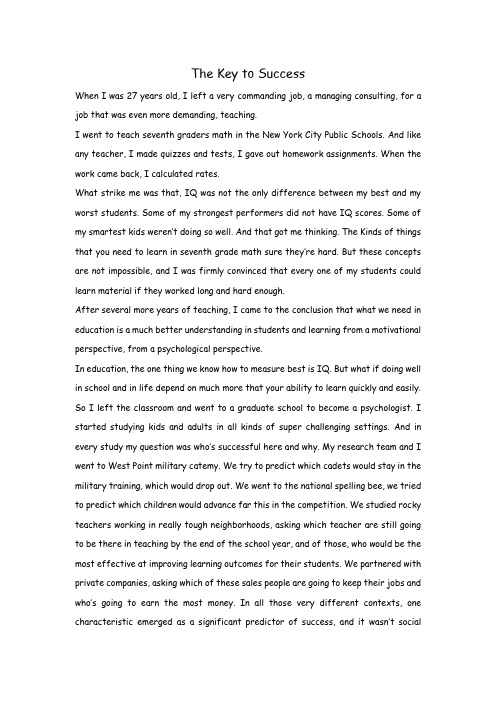
The Key to SuccessWhen I was 27 years old, I left a very commanding job, a managing consulting, for a job that was even more demanding, teaching.I went to teach seventh graders math in the New York City Public Schools. And like any teacher, I made quizzes and tests, I gave out homework assignments. When the work came back, I calculated rates.What strike me was that, IQ was not the only difference between my best and my worst students. Some of my strongest performers did not have IQ scores. Some of my smartest kids weren’t doing so well. And that got me thinking. The Kinds of things that you need to learn in seventh grade math sure they’re hard. But these concepts are not impossible, and I was firmly convinced that every one of my students could learn material if they worked long and hard enough.After several more years of teaching, I came to the conclusion that what we need in education is a much better understanding in students and learning from a motivational perspective, from a psychological perspective.In education, the one thing we know how to measure best is IQ. But what if doing well in school and in life depend on much more that your ability to learn quickly and easily. So I left the classroom and went to a graduate school to become a psychologist. I started studying kids and adults in all kinds of super challenging settings. And in every study my question was who’s successful here and why. My research team and I went to West Point military catemy. We try to predict which cadets would stay in the military training, which would drop out. We went to the national spelling bee, we tried to predict which children would advance far this in the competition. We studied rocky teachers working in really tough neighborhoods, asking which teacher are still going to be there in teaching by the end of the school year, and of those, who would be the most effective at improving learning outcomes for their students. We partnered with private companies, asking which of these sales people are going to keep their jobs and who’s going to earn the most money. In all those very different contexts, one characteristic emerged as a significant predictor of success, and it wasn’t socialintelligence, it wasn’t good looks, physical health and it wasn’t IQ. It was grit.Grit is passion and for very long-term goals. Grit is having . Grit is sticking with your future, day in, day out, not just for the week, not just for the month, but for years, and working really hard to make that future a reality. Grit is living a life like it’s a marathon, not a .A few years ago, I started studying grit in Chicago public schools. I asked thousands of high school juniors to take great questionnaires, and then waited around over a year to see who would graduate. Turns out that, grittier kids are significantly more likely to graduate, even when I matched them on every characteristic I could measure. Things like family income, standardized achievement tests scores even how save kids felt when they were at school. So it’s not that West Point or the national Spelling Bee that grit matters, it’s also in school, especially for kids at rates of dropping out. To me the most shocking thing about grit is that how little we know, how little science knows about building it. Every day parents and teachers asked me how do I build grit kids? What do I do to teach kid a solid work? How do I keep them motivated on the long run? The honest answer is, I don’t know. What I do know is that talent doesn’t make you gritty, our data show very clearly that there are many talented individuals who simply do not follow through on their commitments. In fact, in our data, girt is usually unrelated or even inversely related to measures of talent. So far the best answer of building grit in kids is something called growth mindset. This is an idea developed at Stanford University by, and it is the belief that the ability to learn is not fixed, that it can change with your effort. Doctor shows that when kids read and learned about the brain and how it changes and grows in response to challenge, they’re much likely to persevere when they fail. Because they don’t believe failure is a permanent condition. So growth mind sit is a great idea for building grit, but we need more and that’s why I’m going to end my remarks, because that’s where we are and that’s the world that stands before us. We need to take our best ideas, our strongest intuitions and we need to test them, we need to measure whether we have been successful and we have to be willing to fail, to be wrong, to start over again with the lessons learnt. In other words we need to be gritty ingetting our kids grittier.。
The Key to Success 成功的关键 TED演讲

The Key to SuccessWhen I was 27 years old, I left a very commanding job, a managing consulting, for a job that was even more demanding, teaching.I went to teach seventh graders math in the New York City Public Schools. And like any teacher, I made quizzes and tests, I gave out homework assignments. When the work came back, I calculated rates.What strike me was that, IQ was not the only difference between my best and my worst students. Some of my strongest performers did not have IQ scores. Some of my smartest kids weren’t doing so well. And that got me thinking. The Kinds of things that you need to learn in seventh grade math sure they’re hard. But these concepts are not impossible, and I was firmly convinced that every one of my students could learn material if they worked long and hard enough.After several more years of teaching, I came to the conclusion that what we need in education is a much better understanding in students and learning from a motivational perspective, from a psychological perspective.In education, the one thing we know how to measure best is IQ. But what if doing well in school and in life depend on much more that your ability to learn quickly and easily. So I left the classroom and went to a graduate school to become a psychologist. I started studying kids and adults in all kinds of super challenging settings. And in every study my question was who’s successful here and why. My research team and I went to West Point military catemy. We try to predict which cadets would stay in the military training, which would drop out. We went to the national spelling bee, we tried to predict which children would advance far this in the competition. We studied rocky teachers working in really tough neighborhoods, asking which teacher are still going to be there in teaching by the end of the school year, and of those, who would be the most effective at improving learning outcomes for their students. We partnered with private companies, asking which of these sales people are going to keep their jobs and who’s going to earn the most money. In all those very different contexts, one characteristic emerged as a significant predictor of success, and it wasn’t socialintelligence, it wasn’t good looks, physical health and it wasn’t IQ. It was grit.Grit is passion and for very long-term goals. Grit is having . Grit is sticking with your future, day in, day out, not just for the week, not just for the month, but for years, and working really hard to make that future a reality. Grit is living a life like it’s a marathon, not a .A few years ago, I started studying grit in Chicago public schools. I asked thousands of high school juniors to take great questionnaires, and then waited around over a year to see who would graduate. Turns out that, grittier kids are significantly more likely to graduate, even when I matched them on every characteristic I could measure. Things like family income, standardized achievement tests scores even how save kids felt when they were at school. So it’s not that West Point or the national Spelling Bee that grit matters, it’s also in school, especially for kids at rates of dropping out. To me the most shocking thing about grit is that how little we know, how little science knows about building it. Every day parents and teachers asked me how do I build grit kids? What do I do to teach kid a solid work? How do I keep them motivated on the long run? The honest answer is, I don’t know. What I do know is that talent doesn’t make you gritty, our data show very clearly that there are many talented individuals who simply do not follow through on their commitments. In fact, in our data, girt is usually unrelated or even inversely related to measures of talent. So far the best answer of building grit in kids is something called growth mindset. This is an idea developed at Stanford University by, and it is the belief that the ability to learn is not fixed, that it can change with your effort. Doctor shows that when kids read and learned about the brain and how it changes and grows in response to challenge, they’re much likely to persevere when they fail. Because they don’t believe failure is a permanent condition. So growth mind sit is a great idea for building grit, but we need more and that’s why I’m going to end my remarks, because that’s where we are and that’s the world that stands before us. We need to take our best ideas, our strongest intuitions and we need to test them, we need to measure whether we have been successful and we have to be willing to fail, to be wrong, to start over again with the lessons learnt. In other words we need to be gritty ingetting our kids grittier.。
TED演讲:成功的要诀是什么Angela Lee
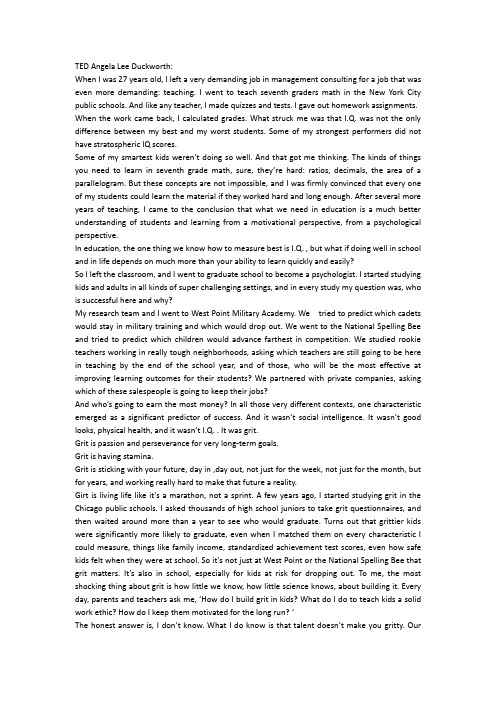
TED Angela Lee Duckworth:When I was 27 years old, I left a very demanding job in management consulting for a job that was even more demanding: teaching. I went to teach seventh graders math in the New York City public schools. And like any teacher, I made quizzes and tests. I gave out homework assignments. When the work came back, I calculated grades. What struck me was that I.Q. was not the only difference between my best and my worst students. Some of my strongest performers did not have stratospheric IQ scores.Some of my smartest kids weren’t doing so well. And that got me thinking. The kinds of things you need to learn in seventh grade math, sure, they’re hard: ratios, decimals, the area of a parallelogram. But these concepts are not impossible, and I was firmly convinced that every one of my students could learn the material if they worked hard and long enough. After several more years of teaching, I came to the conclusion that what we need in education is a much better understanding of students and learning from a motivational perspective, from a psychological perspective.In education, the one thing we know how to measure best is I.Q. , but what if doing well in school and in life depends on much more than your ability to learn quickly and easily?So I left the classroom, and I went to graduate school to become a psychologist. I started studying kids and adults in all kinds of super challenging settings, and in every study my question was, who is successful here and why?My research team and I went to West Point Military Academy. We tried to predict which cadets would stay in military training and which would drop out. We went to the National Spelling Bee and tried to predict which children would advance farthest in competition. We studied rookie teachers working in really tough neighborhoods, asking which teachers are still going to be here in teaching by the end of the school year, and of those, who will be the most effective at improving learning outcomes for their students? We partnered with private companies, asking which of these salespeople is going to keep their jobs?And who’s going to earn the most money? In all those very different contexts, one characteristic emerged as a significant predictor of success. And it wasn’t social intelligence. It wasn’t good looks, physical health, and it wasn’t I.Q. . It was grit.Grit is passion and perseverance for very long-term goals.Grit is having stamina.Grit is sticking with your future, day in ,day out, not just for the week, not just for the month, but for years, and working really hard to make that future a reality.Girt is living life like it’s a marathon, not a sprint. A few years ago, I started studying grit in the Chicago public schools. I asked thousands of high school juniors to take grit questionnaires, and then waited around more than a year to see who would graduate. Turns out that grittier kids were significantly more likely to graduate, even when I matched them on every characteristic I could measure, things like family income, standardized achievement test scores, even how safe kids felt when they were at school. So it’s not just at West Point or the National Spelling Bee that grit matters. It’s also in school, especially for kids at risk for dropping out. To me, the most shocking thing about grit is how little we know, how little science knows, about building it. Every day, parents and teachers ask me, ‘How do I build grit in kids? What do I do to teach kids a solid work ethic? How do I keep them motivated for the long run? ‘The honest answer is, I don’t know. What I do know is that talent doesn’t make you gritty. Ourdata show very clearly that there are many talented individuals who simply do not follow through on their commitments. In fact, in our data, grit is usually unrelated or even inversely related to measures of talent.So far, the best idea I ‘ve heard about building grit in kids is something called ‘ growth mindset. ‘ This is an idea developed at Stanforld University by Carol Dweck, and it is the belief that the ability to learn is not fixed, that it can change with your effort. Dr. Dweck has shown that when kids read and learn about the brain and how it changes and grows in response to challenge, they ‘re much more likely to persevere when they fail, because they don’t believe that failure is a permanent condition. So growth mindset is a great idea for building grit. But we need more. And that’s where I ‘m going to end my remarks, because that’s where we are. That’s the work that stands before us. We need to take our best ideas, our strongest intuitions, and we need to test them. We need to measure whether we’ve been successful, and we have to be willing to fail, to be wrong to start over again with lessons learned. In other words, we need to be gritty about getting our kids grittier. Thank you.。
培养出成功的孩子TED英语演讲稿带翻译

培养出成功的孩子TED英语演讲稿带翻译You know, I didn't set out to be a parenting expert. In fact, I'm not very interested in parenting, per Se. It's just that there's a certain style of parenting these days that is kind of messing up kids, impending their chances to develop into themselves.我并不准备成为育儿专家。
事实上,我对育儿本身也不感爱好。
只是这些天有某种育儿风格的消失,是不利于孩子成长的,而且阻碍了他们进展自己的机会。
There’s a certain style of parenting these days that’s getting in the way. I guess what I’m saying is, we spend a lot of time being very concerned about parents who a ren’t involved enough in the lives of their kids and their education or their upbringing, and rightly so.某种育儿风格的消失正阻碍着孩子的成长。
各位我要说的是,我们把大量的时间花在关怀哪些父母没有足够的参加孩子的生活中,他们的教育或者抚养中,理应如此。
But at the other end of the spectrum, there’s a lot of harm go ing on there as well, where parents feel a kid can’t be successful unless the parent is protecting and preventing at every turn, and hovering over every happening, and micromanaging every moment, and steering their kid towards somesmall subset of colleges and careers.但从另外一个极端来说,这样做会有许多的坏处,父母认为他们的孩子不会胜利,除非有父母事事的爱护和阻挡,对每件事的权衡,围观管理每个时刻并引导他们对高校和职业的选择。
Ted中英文双语演讲稿
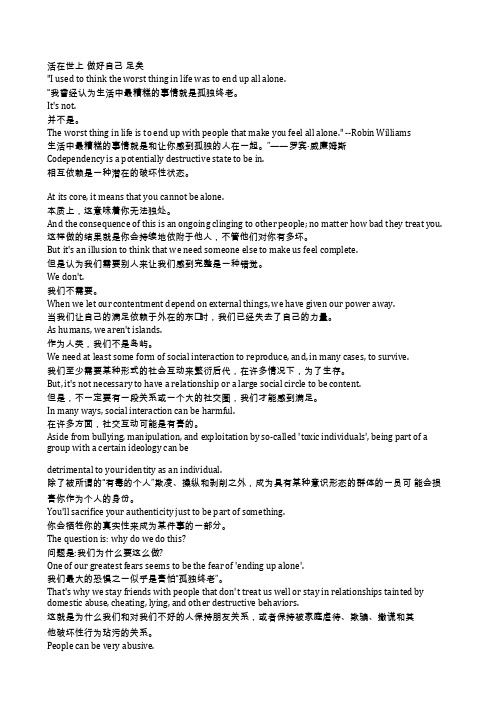
活在世上做好自己足矣"I used to think the worst thing in life was to end up all alone.“我曾经认为生活中最糟糕的事情就是孤独终老。
It's not.并不是。
The worst thing in life is to end up with people that make you feel all alone." --Robin Williams生活中最糟糕的事情就是和让你感到孤独的人在一起。
”——罗宾·威廉姆斯Codependency is a potentially destructive state to be in.相互依赖是一种潜在的破坏性状态。
At its core, it means that you cannot be alone.本质上,这意味着你无法独处。
And the consequence of this is an ongoing clinging to other people; no matter how bad they treat you. 这样做的结果就是你会持续地依附于他人,不管他们对你有多坏。
But it's an illusion to think that we need someone else to make us feel complete.但是认为我们需要别人来让我们感到完整是一种错觉。
We don't.我们不需要。
When we let our contentment depend on external things, we have given our power away.当我们让自己的满足依赖于外在的东⻄时,我们已经失去了自己的力量。
As humans, we aren't islands.作为人类,我们不是岛屿。
ted优秀的人如何训练大脑的英文版完整演讲稿

ted优秀的人如何训练大脑的英文版完整演讲稿Good evening, ladies and gentlemen,Today, I would like to talk about how exceptionally talented individuals like Ted train their brain for success. We all know that Ted is an outstanding person with remarkable achievements. So, what is the secret behind his brilliance? It lies in his ability to constantly challenge and train his brain.Firstly, Ted understands the importance of a growth mindset. He believes that intelligence and abilities can be developed through hard work and dedication. Instead of fearing failure, Ted embraces it as an opportunity to learn and grow. He never settles for mediocrity and is always looking for ways to improve. Training his brain begins with cultivating a mindset that is open to new challenges and willing to push the boundaries of his comfort zone.Secondly, Ted is a voracious reader. He understands that reading is one of the best ways to expand his knowledge and broaden his horizons. He devours books on various topics, from history and science to philosophy and psychology. By exposing himself to diverse ideas and perspectives, he strengthens his critical thinking skills and enhances his creativity. Reading not only allows Ted to stay informed but also enables him to connect seemingly unrelated concepts, leading to innovative solutions.Furthermore, Ted prioritizes continuous learning. He never stops seeking opportunities to acquire new skills and knowledge. Whether it's taking online courses, attending seminars, or participating in workshops, he is always eager to expand hisunderstanding and expertise. In doing so, Ted constantly challenges his brain, forcing it to adapt and develop new neural connections. This continuous learning cycle is crucial for his personal and professional growth.In addition, Ted is a firm believer in the power of practice. He knows that consistent and deliberate practice is the key to mastery. Whether it's honing his public speaking skills, refining his problem-solving abilities, or perfecting his leadership skills, Ted invests countless hours into deliberate practice. This involves breaking down complex tasks into smaller, manageable parts and repeating them with intense focus and attention to detail. Through this intensive practice, Ted's brain becomes wired for excellence.Lastly, Ted understands the value of rest and relaxation. While training his brain is essential, he also knows that allowing it to rest and recharge is equally important. He prioritizes sufficient sleep, engages in regular physical exercise, and incorporates mindfulness practices into his routine. These activities not only help Ted maintain his mental and physical well-being but also provide him with the necessary downtime for his brain to consolidate information and make creative connections.In conclusion, the brain is like a muscle that needs constant training and stimulation to reach its full potential. Ted's success can be attributed to his ability to cultivate a growth mindset, read extensively, prioritize continuous learning, engage in deliberate practice, and find a balance between training and rest. By following in Ted's footsteps, we too can unlock our brain's extraordinary potential and achieve greatness.Thank you.。
ted演讲inside the mind of中英对照
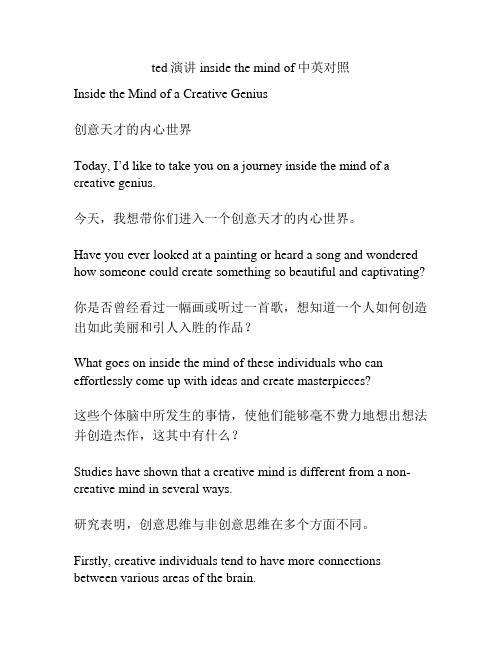
ted演讲inside the mind of中英对照Inside the Mind of a Creative Genius创意天才的内心世界Today, I’d like to take you on a journey inside the mind of a creative genius.今天,我想带你们进入一个创意天才的内心世界。
Have you ever looked at a painting or heard a song and wondered how someone could create something so beautiful and captivating? 你是否曾经看过一幅画或听过一首歌,想知道一个人如何创造出如此美丽和引人入胜的作品?What goes on inside the mind of these individuals who can effortlessly come up with ideas and create masterpieces?这些个体脑中所发生的事情,使他们能够毫不费力地想出想法并创造杰作,这其中有什么?Studies have shown that a creative mind is different from a non-creative mind in several ways.研究表明,创意思维与非创意思维在多个方面不同。
Firstly, creative individuals tend to have more connections between various areas of the brain.首先,创意个体往往在大脑各个区域之间有更多的连接。
This allows for an increased flow of ideas and thoughts, leading toa greater potential for creativity.这会促进思想和想法的更充分流动,从而增加了创造力的潜力。
TED演讲:成功的关键不是智商,而是毅力_励志演讲
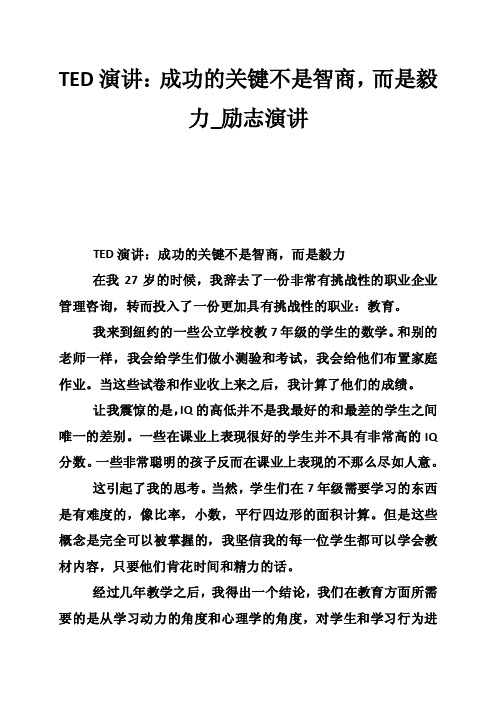
TED演讲:成功的关键不是智商,而是毅力_励志演讲TED演讲:成功的关键不是智商,而是毅力在我27岁的时候,我辞去了一份非常有挑战性的职业企业管理咨询,转而投入了一份更加具有挑战性的职业:教育。
我来到纽约的一些公立学校教7年级的学生的数学。
和别的老师一样,我会给学生们做小测验和考试,我会给他们布置家庭作业。
当这些试卷和作业收上来之后,我计算了他们的成绩。
让我震惊的是,IQ的高低并不是我最好的和最差的学生之间唯一的差别。
一些在课业上表现很好的学生并不具有非常高的IQ 分数。
一些非常聪明的孩子反而在课业上表现的不那么尽如人意。
这引起了我的思考。
当然,学生们在7年级需要学习的东西是有难度的,像比率,小数,平行四边形的面积计算。
但是这些概念是完全可以被掌握的,我坚信我的每一位学生都可以学会教材内容,只要他们肯花时间和精力的话。
经过几年教学之后,我得出一个结论,我们在教育方面所需要的是从学习动力的角度和心理学的角度,对学生和学习行为进行一次更为深刻的理解。
在教育体系中,我们都知道评价优秀学生的标准就是IQ,但如果在学校和生活中的优秀表现远不仅仅依赖于你轻松高效学习的能力呢?所以我离开了讲台,回到学校继续攻读心理学硕士学位。
我开始研究孩子和大人,在各种非常具有挑战性的情况下,以及在各项研究中,我的问题是谁才是成功者,为什么他们会成功?我和我的研究团队前往西点军校展开调研,我们试图预测哪些学员能够耐得住军队的训练,哪些会被淘汰出局。
我们前去观摩全国拼字比赛,同时也试着预测哪些孩子会晋级到最后的比赛。
我们研究在恶劣的工作环境下工作的,刚入行的老师,询问他们哪些老师决定会在学年结束后继续留下来任教,以及他们之中谁能最快地提高学生的学习成绩。
我们与私企合作,向他们询问哪些销售人员可以保住工作,哪些可以赚钱最多?在所有那些不同的情境下,一种性格特征凸显了出来,这种特征在很大程度上预示了成功。
而且它并不是社交智力。
不是漂亮的外表,强健的体魄,也不是很高的IQ,它是坚毅。
ted lessons worth sharing英文稿

"ted lessons worth sharing英文稿"The night before I was heading for Scotland, I was invited to host the final of "China's Got Talent" show in Shanghai with the 80,000 live audience in the stadium. Guewho was the performing guest? Susan Boyle. And I told her, "I'm going to Scotland the next day." She sang beautifully, and she even managed to say a few words in Chinese. [Chinese] So it's not like "hello" or "thank you," that ordinary stuff. It means "green onion for free." Why did she say that? Because it was a line from our Chinese parallel Susan Boyle -- a 50-some year-old woman, a vegetable vendor in Shanghai, who loves singing Western opera, but she didn't understand any English or French or Italian, so she managed to fill in the lyrics with vegetable names in Chinese. (Laughter) And the last sentence of Nessun Dorma that she was singing in the stadium was "green onion for free." So [as] Susan Boyle was saying that, 80,000 live audience sang together. That was hilarious.来苏格兰(做TED讲演)的前夜,我被邀请去上海做”中国达人秀“决赛的评委。
TED英语演讲:请相信你可以进步
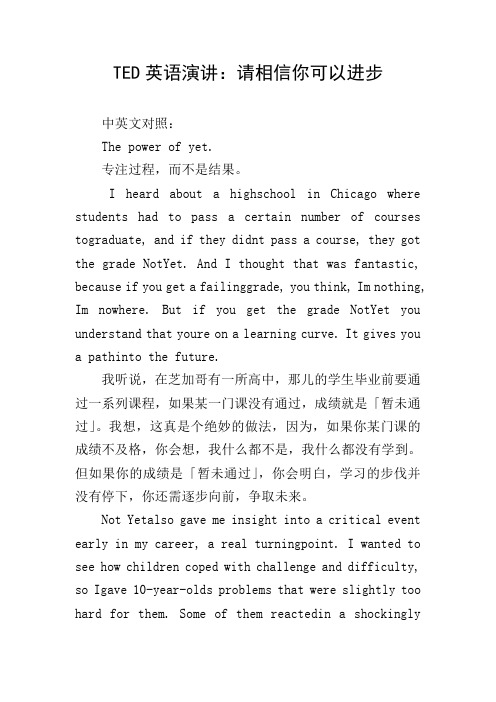
TED英语演讲:请相信你可以进步中英文对照:The power of yet.专注过程,而不是结果。
I heard about a highschool in Chicago where students had to pass a certain number of courses tograduate, and if they didnt pass a course, they got the grade NotYet. And I thought that was fantastic, because if you get a failinggrade, you think, Im nothing, Im nowhere. But if you get the grade NotYet you understand that youre on a learning curve. It gives you a pathinto the future.我听说,在芝加哥有一所高中,那儿的学生毕业前要通过一系列课程,如果某一门课没有通过,成绩就是「暂未通过」。
我想,这真是个绝妙的做法,因为,如果你某门课的成绩不及格,你会想,我什么都不是,我什么都没有学到。
但如果你的成绩是「暂未通过」,你会明白,学习的步伐并没有停下,你还需逐步向前,争取未来。
Not Yetalso gave me insight into a critical event early in my career, a real turningpoint. I wanted to see how children coped with challenge and difficulty, so Igave 10-year-olds problems that were slightly too hard for them. Some of them reactedin a shockinglypositive way. They said things like, I love achallenge, or, You know, I was hoping this would beinformative.「暂未通过」也让我联想起一件尤为重要的、发生在我职业生涯初期的事情,这件事对我而言是一个转折点。
- 1、下载文档前请自行甄别文档内容的完整性,平台不提供额外的编辑、内容补充、找答案等附加服务。
- 2、"仅部分预览"的文档,不可在线预览部分如存在完整性等问题,可反馈申请退款(可完整预览的文档不适用该条件!)。
- 3、如文档侵犯您的权益,请联系客服反馈,我们会尽快为您处理(人工客服工作时间:9:00-18:30)。
Richard St.John在Ted 英语演讲:成功的八个秘诀(中英双语)2014-09-08激情,刻苦,精通,专注,强迫,服务,点子,坚持,这就是成功的秘诀This is really a two-hour presentation I give to high school students, cut down to three minutes. And it all started one day on a plane, on my way to TED, seven years ago. And in the seat next to me was ahigh school student, a teenager, and she came from a really poor family.这真的是一个我给高中学生做的2个小时的演讲现在缩到了3分钟所有的一切都是从7年前的一天开始,我坐在飞往TED会议的飞机上。
在我邻座坐的是一个高中生,一个十几岁的年轻人。
她生于一个贫穷的家庭而且她的愿望是成就一番事业所以她问了我一个简单的小问题。
And she wanted to make something of her life, and she asked me a simple little question. She said, "What leads to success?" And I feltreally badly, because I couldn't give her a good answer. So I get off the plane, and I come to TED. And I think, jeez, I'm in the middle of a room of successful people! So why don't I ask them what helped them succeed, and pass it on to kids? So here we are, seven years, 500 interviews later, and I'm gonna tell you what really leads to success and makes TED-sters tick.她说:“怎样做才能成功呢?”我当时觉得糟透了因为我不能给她一个满意的答案后来我下了飞机,来到TED 忽然间我想到,天啊,我置身于一屋子成功人士之中!为什么我不问问他们是怎样走向成功的呢。
这样我就可以把答案告诉孩子们了。
所以就这样,7年中我坐了500次采访。
现在我就要告诉你们是什么带来了成功是什么启发了TED演讲者们。
【And the first thing is passion.】第一点是激情Freeman Thomas says, "I'm driven by my passion." TED-sters do it for love; they don't do it for money. Carol Coletta says, "I would paysomeone to do what I do." And the interesting thing is: if you do it for love, the money comes anyway.Freeman Thomas 说:“我总是被我的热情所牵引着”TED的讲演者因为有爱才做事情,不是为了钱。
Carol Colletta 说:“我会付给别人钱去做我的工作。
”有趣的是如果你是为了爱而做的,钱自然而然就来了。
【Work!】刻苦Rupert Murdoch said to me, "It's all hard work. Nothing comes easily. But I have a lot of fun." Did he say fun? Rupert? Yes! TED-sters do have fun working. And they work hard. I figured, they're not workaholics. They're workafrolics.Rupert Murdoch 曾经告诉过我“都是刻苦“为努力”“天下没有白吃的午餐。
但是我得到了很多乐趣。
”他提到了乐趣??Rupert?是的!TED讲演者都有一份充满乐趣的工作,而且他们都很刻苦。
我觉得,他们都不是工作狂,他们是享受工作狂。
【Good! 】精通Alex Garden says, "To be successful put your nose down in something and get damn good at it." There's no magic; it's practice, practice, practice.Alex Garden说:”要想成功,就要真的深入其中““然后做到精通。
”想要做到精通没有秘诀,就是练习,练习,再练习。
还【And it's focus.】有就是专注Norman Jewison said to me, "I think it all has to do with focusing yourself on one thing."Norman Jewison 告诉过我,“我想成功就要使自己专注于一件事情”【And push! 】强迫David Gallo says, "Push yourself. Physically, mentally, you've gotta push, push, push." You gotta push through shyness and self-doubt. Goldie Hawn says, "I always had self-doubts. I wasn't good enough; I wasn't smart enough. I didn't think I'd make it." Now it's not always easy to push yourself, and that's why they invented mothers. (Laughter)Frank Gehry —Frank Gehry said to me, "My mother pushed me."David Gallo说:“强迫你自己,”“心灵上,神情上。
你一定要强迫,强迫,强迫。
”“你要强迫自己去战胜羞涩和自我怀疑”Goldie Hawn说:“我总是怀疑自己。
怀疑自己不够优秀,不用聪明。
我从不相信我会成功。
”想要成功地强迫自己并不总容易,这就是为什么要发明妈妈。
Frank Gehry-Frank Gehry对我说:“我妈妈过去总是督促我。
”【Serve!】服务Sherwin Nuland says, "It was a privilege to serve as a doctor." Now alot of kids tell me they want to be millionaires. And the first thing I say to them is: "OK, well you can't serve yourself; you gotta serve others something of value. Because that's the way people really get rich."Sherwin Nuland 说:“能够作为一名医生为他人服务是一种荣幸。
”现在很多孩子告诉我他们想成为百万富翁。
但是一件事我对他们说的是,“好的,但是你不能为你自己服务,”“你需要为他人提供对他人有利的服务。
””因为这就是人们致富的方式。
“【Ideas!】点子TED-ster Bill Gates says, "I had an idea: founding the firstmicro-computer software company." I'd say it was a pretty good idea. And there's no magic to creativity in coming up with ideas —it's just doing some very simple things. And I give lots of evidence.TED演讲者Bill Gates 说:”我曾经有过一个点子,“成立第一个微机软件公司。
”我必须承认这真的是很好的一个点子。
对于能想出点子的创造力来讲没有什么魔力可言。
都是些简单平常的事情。
而且我可以举出很多证据。
【Persist!】坚持Joe Kraus says, "Persistence is the number one reason for our success." You gotta persist through failure. You gotta persist through crap! Which of course means "Criticism, Rejection, Assholes andPressure." (Laughter)So, the big —the answer to this question is simple: Pay 4,000 bucks and come to TED. Or failing that, do the eight things —and trust me, these are the big eight things that lead to success. Thank you TED-sters for all your interviews!Joe Kraus 说“恒心是我们成功地第一条原因。
”你必须坚持度过失败,你必须坚持度过crap,这里的crap是指”批评,拒绝,卑鄙小人和压力“(大笑)所以,这个问题的答案很简单:付4000块来TED会场。
